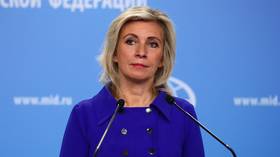Claims Russia restricting international media are false, foreign ministry insists, as Dutch-backed business news site VTimes folds

One of Russia’s top diplomats insisted on Thursday that journalists working for overseas outlets in the country have the same rights as domestic media, and that the ‘foreign agent’ labeling law is a response to American measures.
Speaking as part of a meeting at the St. Petersburg International Economic Forum, Foreign Ministry spokeswoman Maria Zakharova said that claims Moscow was curtailing international correspondents’ coverage were incorrect.
According to her, the requirement for outlets that receive overseas funding to declare their status was straightforward, and any suggestion it is “somehow an attempt to prevent international media from working is not true.”
“We will do our best to demonstrate this information to be inaccurate, because it is disinformation to claim that foreign publications in our country do not enjoy the same rights as others,” Zakharova said, claiming there were a range of efforts to distort the true meaning of the ‘foreign agent’ law.
Also on rt.com ‘Register and keep working’: Russia’s ‘foreign agents’ law protects from outside meddling, doesn’t infringe on anyone, Putin saysInstead, she argued, the regulations were a “retaliatory” response to moves by Washington and other Western capitals to clamp down on Russian media. However, the official added, it had moved beyond being simply “tit-for-tat,” and, instead, acted as a safeguard against aggressive foreign activity.
Anna Belkina, Deputy Editor in Chief of RT, also set out how the news group had been designated as a foreign agent under parallel measures. She questioned how internationally-backed outlets, such as US state-run RFERL, could take exception at being asked to display their status prominently and face fines if they fail to do so, given what she called the more stringent restrictions RT faces abroad.
On Wednesday, the Russian-language news site VTimes, which has funding links to the Dutch Ministry of Foreign Affairs, announced it would close just weeks after it was designated a ‘foreign agent’ by the Russian Ministry of Justice. The outlet cited the complexity of complying with the rules, and claimed it would be unable to rely solely on reader contributions for funding – an assertion Zakharova rejected out of hand.
The spokeswoman was incredulous that the designation alone would be enough to cause the publication to go under, asking, “Have their sponsors gone? So, ask the sponsors why they don’t want to fund this media.”
VTimes also said that it was concerned about the prospects of criminal prosecution, and potential jail time, for its staff should they fall foul of the legislation. Under the rules, individuals, potentially including journalists, could be designated as foreign agents and be required to meet legal standards themselves.
While this has not been applied to any reporters in practice, to date, in Russia, a number of other nations have used prison terms as a tool to stifle the media. For example, Turkey, a close ally of the Netherlands through shared membership of the US-led NATO bloc, is holding around 120 journalists in jails, according to Amnesty International.
The Dutch-funded outlet added, in its statement, that “essentially, VTimes is being pushed into the opposition political media niche. But we envisioned and have created a completely different outlet.” The publication was fronted by former staff of Vedomosti, a Moscow-based business daily, which was sold, last year, to businessman Ivan Yeremin. After the takeover, a number of senior employees resigned in protest at the appointment of Andrei Shmarov as editor, who they perceived as pro-Kremlin.
President Vladimir Putin has previously publicly defended the law as an essential measure to ensure readers know content has been financed from abroad. “What’s wrong with the foreign agent status? We’re not the ones who came up with it,” he said, citing the US’ policy precedent. According to him, the law “exists simply to protect Russia from external meddling in its politics,” and, while some countries forbid foreign meddling outright, “we do not ban it,” he said.
In an exclusive interview with RT after the meeting, Zakharova warned that the West’s approach to Russia was causing confrontation, and backfiring against its own interests. “We are for the development of equal relations,” she said, but argued that the measures and sanctions being imposed on Moscow were hurting the West far more than they do Russia.
Like this story? Share it with a friend!













